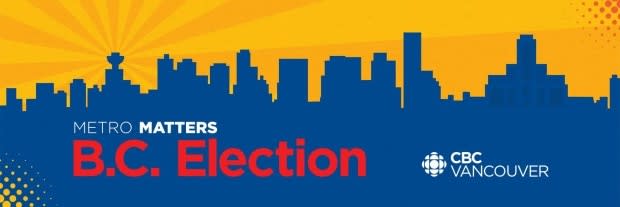Introducing Metro Matters: B.C. election edition
Ready or not — it's happening.
After weeks of speculation, British Columbians now know they'll be heading to the polls Oct. 24, for a snap election in an already head-spinning year.
This election campaign is going to look different — for voters, for reporters and for the parties and candidates themselves. We're here to make sense of it. So for the duration of the campaign, Metro Matters will be putting out a special election edition, which you can expect in your inbox every evening of the campaign Monday through Friday.
It will tell you everything you need to know about the day that was on the campaign trail, and will include analysis, insider notes from CBC reporters Justin McElroy and Tanya Fletcher, profiles of ridings to watch, and more. Have an election question you need answered? Write to us and we'll do our best to look into it for you.
Thanks for joining us for the ride, B.C.

First things first — why are we voting during a pandemic?
The short answer is, the pandemic is actually part of the reason we're in an election.
Back in 2017, NDP Leader John Horgan teamed up with the Greens, defeating the Liberals in a confidence vote.
They passed legislation setting a fixed election date for October 2021. But now, Horgan is arguing that — with COVID-19 sticking around — B.C. needs a stable government and an election can't wait another year.
As election speculation intensified, the B.C. Liberal Party and the Green Party criticized Horgan for launching an election during a global pandemic, with some suggesting his timing has more to do with his polling numbers than the state of the province. (More on that here.)
How do you campaign (and vote) during a pandemic?
Elections typically involve things like boisterous campaign rallies, journalists and candidates packed onto buses crossing the province, and door-knocking — all things that seem pretty much ideal for spreading COVID-19. So campaigns are going to have to get creative about reaching voters.
And what about voting day? Like pretty much everything in 2020, it's going to look different.
Voting online or over the phone is not on the table. But there will also be ample opportunity for early voting to avoid long lineups. For standard election day voting, many of the measures we've grown accustomed to over the past six months will be in place — that means you'll see things like physical distancing, hand sanitizer and election officials in personal protective equipment (PPE).
One potential game-changer: Elections B.C. predicts more than a third of B.C. voters will vote by mail. Since Horgan's snap election announcement Monday, 20,000 people have already requested mail-in ballots, compared to just 6,500 during the 2017 election. (For more info on how you can get in on that, tap here.)
CBC reporter Justin McElroy answers: How will mail-in ballots affect election night?
The short answer is "we might not know who won."
Elections BC has said it won't be changing how it counts mail-in ballots for this election. That means it will be counting those hundreds of thousands of votes until 13 days after the election.
At first blush, that sounds like a pretty boring election night. But keep in mind, there's a reason most ridings are called by decision desks in past election nights before all the votes are counted: most of the time a candidate is ahead by enough after 70 or 80 per cent of the votes are in that it's statistically improbable for them to lose.
Put another way, if it's like the last provincial election where the parties were neck and neck all night — with several ridings determined by less than 1,000 votes — then we'll be waiting a couple of weeks to know who the premier is.
But if it's like a "typical" B.C. election where the winning party is up five to 15 per cent over the second place party on election night, a winner can be confidently declared.
Of course, you could just be patient and let the democratic process play out without demanding to know the winner by a certain hour. But that wouldn't be nearly as emotionally gratifying in the short-term.

Other fast facts for Tuesday, Sept. 22
This is the first election to be held on a Saturday.
This will also be the first election to be held under a state of emergency in B.C. since the Second World War.
The Canadian Press reported that Liberal Leader Andrew Wilkinson wants three televised debates during the provincial election campaign so voters can hear what each party has to offer — it's still unclear how those will take place during a pandemic.
Your reading list
B.C. NDP Leader John Horgan gambles popularity against pandemic in bid for historic majority. In a year of world events nobody wanted, British Columbians will be getting an election almost nobody wanted. But Horgan doesn't need people to be excited about an election. He just needs enough of them to believe he's the best person to run British Columbia for the next four years.
How will voting work in B.C. during a pandemic? What we know so far about the way voting in the Oct. 24 provincial election will work.
B.C. NDP completed 79% of its campaign promises in 1st term. While 96 platform pledges are done or well underway, there are several big ones where the jury is out.
That's it for us today. For the latest headlines, check cbc.ca/bc.
We want to help you make informed decisions come voting time, so if you have questions, send them in and we will work on getting you the answers. Drop us a line at metromatters@cbc.ca.

